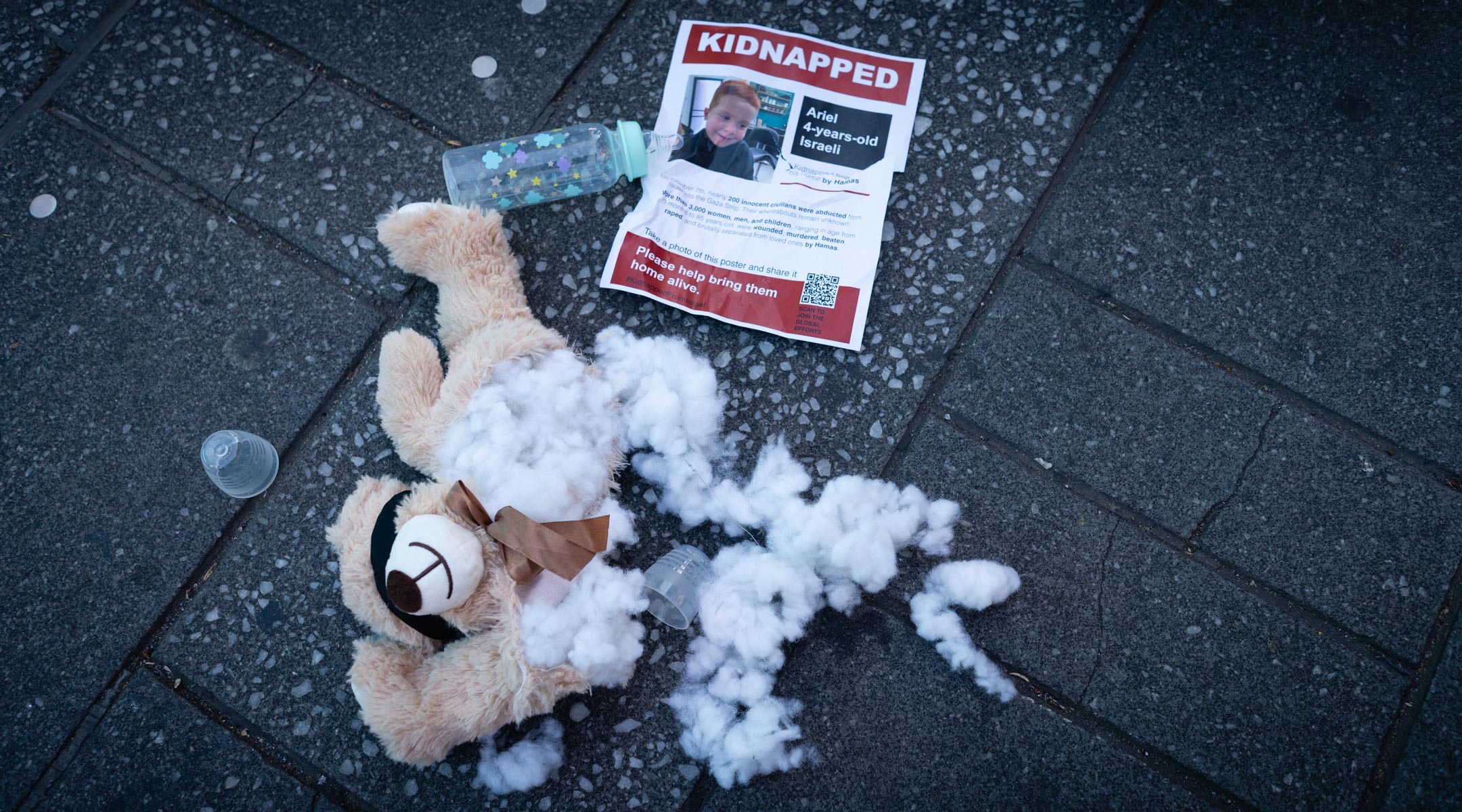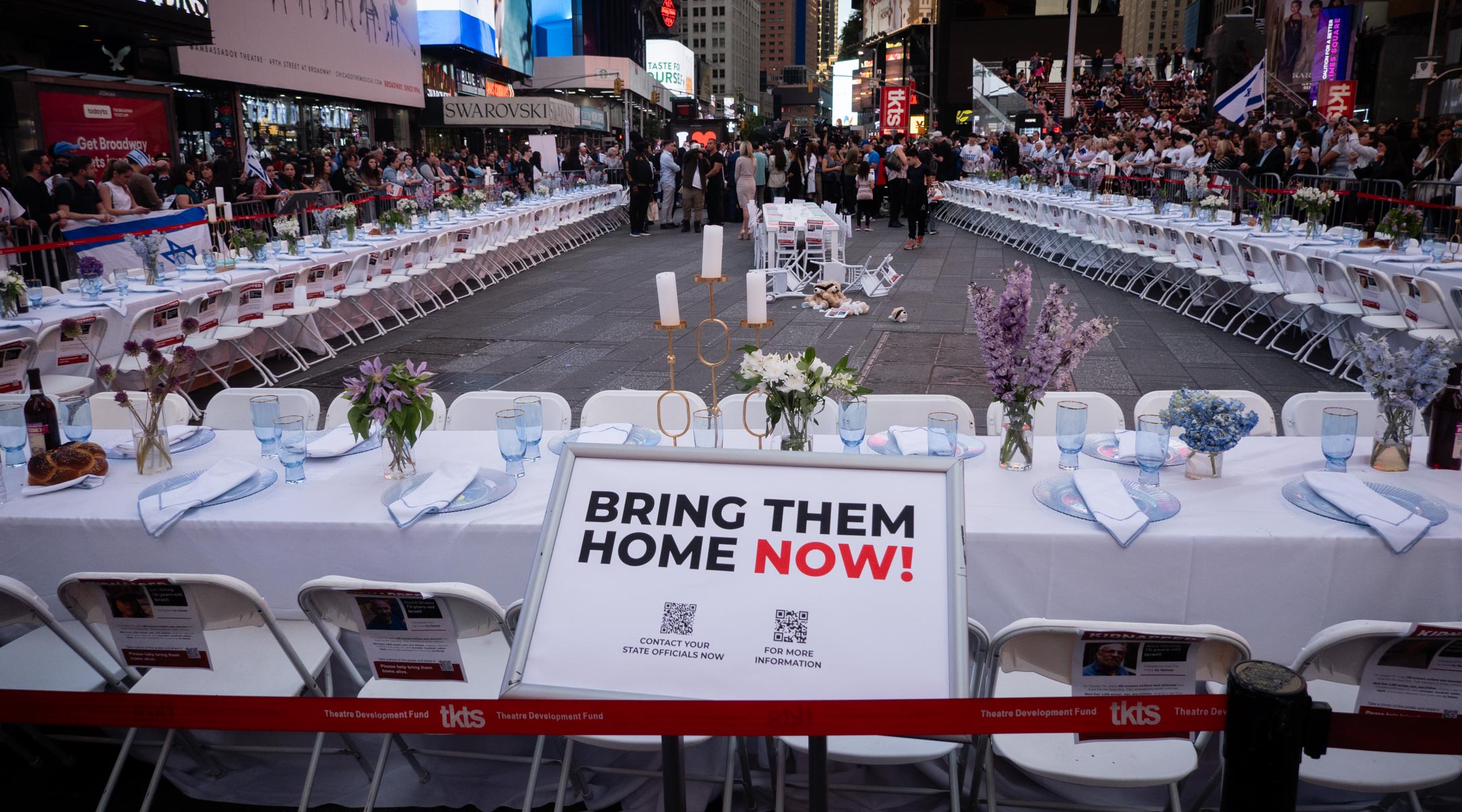(New York Jewish Week) — In front of a long U-shaped table in Times Square, set for 224 people, a crowd began to sing “Happy Birthday” for a 12-year-old boy named Erez.
Thursday was Erez’s birthday, but the gathering was no celebration. Erez, along with his sister, Sahar, and father, Ofer Calderon, are three of the more than 200 hostages taken by Hamas in the terror group’s Oct. 7 invasion of Israel. Erez’s grandmother and cousin were killed.
The song was led by Omer Lubaton-Granot, an Israeli activist in New York who has his own connection to the hostages: four of his relatives were taken captive. Two others are dead.
“Erez, we want you to hear us all the way from New York. We’re celebrating your birthday here and we’ll soon celebrate your freedom,” he said. “Your mother deserves to hug you on your birthday and you deserve her hug and we will do whatever we can to make it happen.”
The settings at the table, along with their empty seats, represent each of Hamas’ captives in Gaza. The Israeli-American Council organized the event to push for the release of the hostages and raise awareness of their plight. It’s meant to represent a Shabbat table and is one of a series that have been symbolically set for the hostages in cities across the United States, Israel and around the world. In other displays, strollers or teddy bears have been arrayed to represent the captive children.
At the head of this New York Shabbat table, in Duffy Square, a wooden high chair bore the picture of a 9-month-old Israeli baby named Kfir, beneath the word “kidnapped.” On the table was a pink plate for a child, a loaf of challah and an array of violet and white flowers.
A separate table for kids was set in the middle of the U-shaped table. Baby bottles lay on the center table next to pastel-colored plates. Splayed out on the pavement were teddy bears, their eyes blindfolded.
“My cousin, her children, 200 other people are trapped and we don’t know where they are,” Navé Strauss, a New Yorker whose relatives are being held in Gaza, told the crowd. “Repeat the call, lay the pressure on everybody in a position of power, anybody in the position to negotiate for their freedom today, right now. Bring them home.”

An empty shabbat table symbolizing the over 200 hostages held by Hamas in Gaza, in Times Square, New York City, October 27, 2023. (Luke Tress)
Hundreds of Israelis and supporters ringed the display as passersby stopped to take photos. Some of the Israelis handed out fliers and engaged with tourists, explaining the meaning of the exhibit, which stood in the square for five hours.
There were no significant counter-protests, though a brief scuffle broke out when a passerby grabbed a man’s Israeli flag. Police quickly separated the pair. Several people spoke out against the demonstration, touching a nerve for the participants.
“Everything that’s happening and you’re still supporting Israel?” one woman shouted.
“They’re kids. How do you live with yourself?” an attendee responded.
The fliers affixed to the chairs, which were designed by the Israeli artist Nitzan Mintz and her partner, who goes by the name Dede Bandaid, have also become a point of contention The posters have been plastered around New York City and other cities worldwide, and anti-Israel activists have torn them down or defaced them. In New York City this week, someone pasted the word “occupier” over the label “kidnapped” on a poster bearing the name and photo of a child, suggesting that they shouldn’t be viewed as a civilian.
The hostages have now been in captivity for 20 days. Hamas has released four in a move the terror group depicted as a humanitarian gesture but that has been seen widely as a public relations ploy. The Israeli American Council held a rally attended by thousands in Times Square last week and vowed to continue holding events until the hostages are released. Thursday’s event was backed by an array of Jewish groups including the UJA-Federation New York, the World Jewish Congress, the American Jewish Committee New York and the Jewish Community Relations Council of New York.
In addition to the Israeli hostages, nationals from dozens of other countries are held by Hamas in Gaza.
“Behind the staggering number of hostages, 224 and counting, there are individual lives and families,” Lubaton-Granot said. “Every minute that passes without their loved ones is pure agony.”
The New York Jewish Week brings you the stories behind the headlines, keeping you connected to Jewish life in New York. Help sustain the reporting you trust by donating today.





